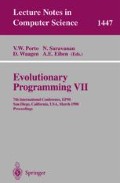Abstract
We investigate the problem of discovering a multiple of the cycle length of a periodic function. A generalization of the crossover operator is proposed which is offset invariant, i.e. it functions in an unchanged manner if a constant offset is added to both parents. The properties of this operator are investigated using a mixture of theoretical and empirical techniques. Its convergence is demonstrated even in the extreme case of a near random evaluation function. We investigate its application to the use of optimization to find some multiple of the period of a periodic function. This investigation takes place in the context of an exponential function defined over the integers modulo a composite number. Competing techniques to accomplish this using optimization are demonstrated and their growth rates empirically investigated. A comparison of the performance of normal crossover and offset invariant crossover demonstrates an advantage for the offset invariant crossover operator. Finally we show how our methods can be applied to problems of RSA cryptography.
Preview
Unable to display preview. Download preview PDF.
References
J. E. Baker, “Reducing Bias and Inefficiency in the Selection Algorithm,” Proc. of the Second International Conference on Genetic Algorithms, Hillsdale, NJ: Lawrence Erlbaum Ass., p14–21, 1987.
D. M. Burton, Elementary Number Theory, Second Edition, Dubuque, IA: Wm. C. Brown Pub., 1989.
C. Hohn and C. R. Reeves, “Crossover Landscape for Onemax” in Proc. of the Second Nordic Workshop on Genetic Algorithms and their Applications, ed. J. T. Alander, Vaasa, Finland: FAIS, p27–44, 19926.
J. Nechvatal, “Public Key Cryptography” in Contemporary Cryptology: The Science of Information Integrity, ed. G. J. Simmons, New York, NY: IEEE Press, pl79–288, 1992.
R. L. Rivest, A. Shamir and L. Adleman, “A Method for Obtaining Digital Signatures and Public-Key Cryptosystems,” Communications of the ACM, V21, p120–126, Feb., 1978.
R. A. Rueppel, “Stream Ciphers,” in Contemporary Cryptology: The Science of Information Integrity, ed. G. J. Simmons, New York, NY:IEEE Press, p65–134, 1992.
H. P. Schwefel, Numerical Optimization for Computer Models, John Wiley, Chichester, UK, 1981.
D. Whitley, K. Mathias, and P. Fitzhorn, “Delta Coding: An Iterative Search Strategy for Genetic Algorithms,” Proc. of the Fourth International Conference on Genetic Algorithms, Los Altos, CA: Morgan Kaufman, p77–84, 1991
Author information
Authors and Affiliations
Editor information
Rights and permissions
Copyright information
© 1998 Springer-Verlag Berlin Heidelberg
About this paper
Cite this paper
Davis, C., Eick, C.F. (1998). Using offset invariant crossover as a tool for discovering cycle lengths of a periodic function. In: Porto, V.W., Saravanan, N., Waagen, D., Eiben, A.E. (eds) Evolutionary Programming VII. EP 1998. Lecture Notes in Computer Science, vol 1447. Springer, Berlin, Heidelberg. https://doi.org/10.1007/BFb0040829
Download citation
DOI: https://doi.org/10.1007/BFb0040829
Published:
Publisher Name: Springer, Berlin, Heidelberg
Print ISBN: 978-3-540-64891-8
Online ISBN: 978-3-540-68515-9
eBook Packages: Springer Book Archive

